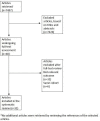Achieving remission or low disease activity is associated with better outcomes in patients with systemic lupus erythematosus: a systematic literature review
- PMID: 34548375
- PMCID: PMC8458331
- DOI: 10.1136/lupus-2021-000542
Achieving remission or low disease activity is associated with better outcomes in patients with systemic lupus erythematosus: a systematic literature review
Abstract
Background: Remission and low disease activity (LDA) have been proposed as the treatment goals for patients with systemic lupus erythematosus (SLE). Several definitions for each have been proposed in the literature.
Objective: To assess the impact of remission/LDA according to various definitions on relevant outcomes in patients with SLE.
Methods: This systematic literature review was conducted according to the Preferred Reporting Items for Systematic Reviews and Meta-Analyses using PubMed (1946-week 2, April 2021), Cochrane library (1985-week 2, week 2, April 2021) and EMBASE (1974-week 2, April 2021). We included longitudinal and cross-sectional studies in patients with SLE reporting the impact of remission and LDA (regardless their definition) on mortality, damage accrual, flares, health-related quality of life and other outcomes (cardiovascular risk, hospitalisation and direct costs). The quality of evidence was evaluated using the Newcastle-Ottawa Scale.
Results: We identified 7497 articles; of them, 31 studies met the inclusion criteria and were evaluated. Some articles reported a positive association with survival, although this was not confirmed in all of them. Organ damage accrual was the most frequently reported outcome, and remission and LDA were reported as protective of this outcome (risk measures varying from 0.04 to 0.95 depending on the definition). Similarly, both states were associated with a lower probability of SLE flares, hospitalisations and a better health-related quality of life, in particular the physical domain.
Conclusion: Remission and LDA are associated with improvement in multiple outcomes in patients with SLE, thus reinforcing their relevance in clinical practice.
Prospero registration number: CRD42020162724.
Keywords: health care; outcome assessment; quality of life; systemic lupus erythematosus.
© Author(s) (or their employer(s)) 2021. Re-use permitted under CC BY-NC. No commercial re-use. See rights and permissions. Published by BMJ.
Conflict of interest statement
Competing interests: MFU-G: Grant/research support from Jannsen, Pfizer, not related to this article. CM-P declared no conflict of interest. CR-S: Grant/research support from Jannsen, not related to this article. GP-E: Grant/research support from JANSSEN and GSK; consultant of JANNSEN, GSK and SANOFI; speakers bureau: Pfizer, JANNSEN and GSK, not related to this article. RFvV: Grant/research support from AbbVie, Arthrogen, Bristol-Myers Squibb, GlaxoSmithKline, Lilly, Pfizer and UCB; consultant of AbbVie, AstraZeneca, Biotest, Bristol-Myers Squibb, Celgene, GSK, Janssen, Lilly, Medac, Merck, Novartis, Pfizer, Roche and UCB, not related to this article. GB: Grant/research support from GSK, Pfizer; consultant of Novartis, SOBI, not related to this article. GA declared no conflict of interest. BAP-E: Grant/research support from GSK, Jannsen; consultant of GSK, Janssen; speakers bureau: GSK, Janssen, not related to this article.
References
Publication types
MeSH terms
LinkOut - more resources
Full Text Sources
Medical
Miscellaneous

